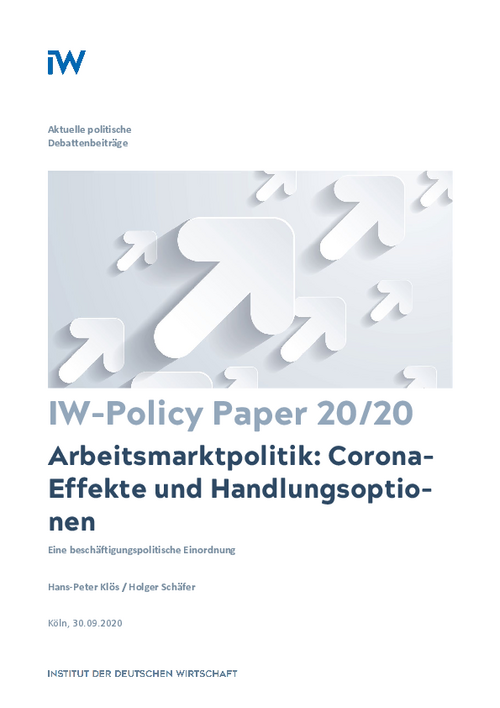The German labor market is being affected by the consequences of the corona crisis. This also threatens labor market outcomes, for example income distribution. In particular because of the strong use of short-time work, the increase in registered unemployment has so far been relatively low compared to the collapse in demand and production.

Labor Market Policy: Corona Effects and Options for Action: An Employment Policy Classification

The German labor market is being affected by the consequences of the corona crisis. This also threatens labor market outcomes, for example income distribution. In particular because of the strong use of short-time work, the increase in registered unemployment has so far been relatively low compared to the collapse in demand and production.
A previously unprecedented coordinated use of financial, economic and labor market policy instruments has contributed to this, provding „protective shields“ for both companies and employees. These have been targeted on both the labor demand and labor supply side and have so far stabilized production and employment significantly. An initial evaluation of the effectiveness and efficiency of the extensive measures to stabilize the economy is still pending.
Because of the financial dimensions of the use of funds, the measures taken cannot be continued indefinitely. Beyond the current stabilization of the economy, there is therefore also an increasing debate about structural reform measures to further stabilize the labor market after the crisis. In essence, there are two fundamental schools of thought opposing each other: A central line of political debate is the revival of concepts for reducing working hours and introducing a universal basic income, supplemented by further legal claims for employees, for example in the home office area and in further training and qualification. Another line of debate aims to promote more flexible forms of employment and to lower the hiring barriers for companies, for example in working hours, fixed-term and self-employment law.
On the labor supply side, a general reduction in working hours is viewed critically because it leads to falling hourly productivity and rising unit labor costs. An unconditional basic income has a negative effect on the labor supply and cannot be financed. A right to work from home interferes with the right of disposition of companies. The regulations on home office is clearly a matter of company level agreements. On the labor demand side, increased further training can have a positive effect. However, there is a risk of deadweight effects in view of a funding framework that has been broadened by the Qualification Opportunities Act. This would apply to a greater extent with a right to further training. In contrast, the relaxation of the right of fixed-term contracts for new hirings, the flexibilization of the Working Hours Act with regard to the maximumweekly working and minimum rest periods as well as the facilitation of flexible employment, e.g. by suspending the maximum duration period for temporary work and a changed status determination procedure for the delimitation against dependent employees should be discussed further.

Labor Market Policy: Corona Effects and Options for Action: An Employment Policy Classification

More on the topic

Determinants of personnel planning in Germany
The German labor market has been growing since 2005. The dip in the wake of the coronavirus pandemic between 2020 and 2022 is an exception, as the German labor market has reached a record level of 45.9 million people in employment by 2023.
IW
What factors influence the career ambitions of people with disabilities?
Many companies in Germany report having difficulties not only in recruiting employees, but also in filling vacant management positions.
IW